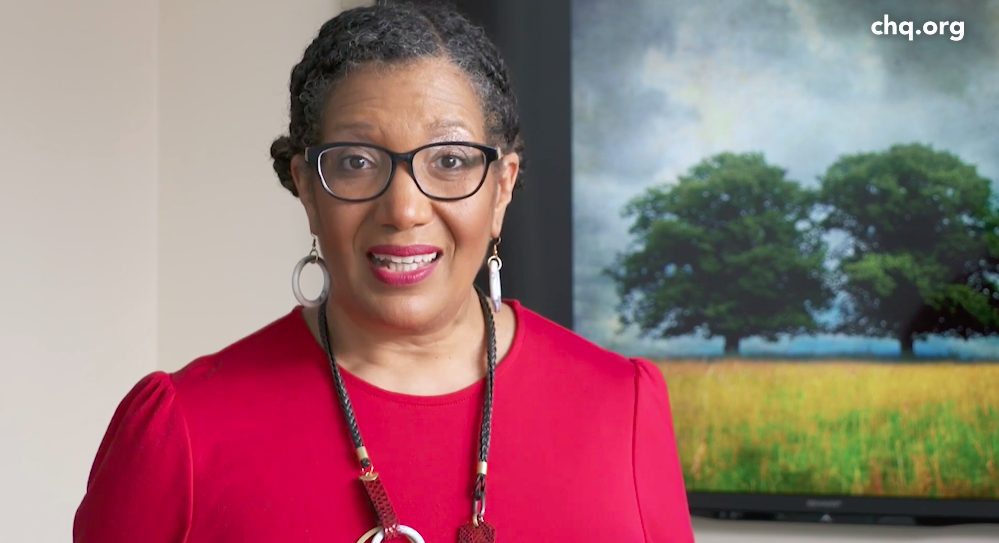
Black. Indigenous. Colonized. To Lisa Sharon Harper, this is Jesus.
“People of African descent and other people who have been colonized around the world, when they read the text for themselves, irrespective of what their master told them what the text meant, they see a Brown, colonized, indigenous Jesus,” Harper said. “They see a people serially enslaved and serially colonized. There is a kinship of experience and social location with every single writer of this text.”
Harper, founder and president of Freedom Road, spoke on progressive Evangelical Christianity for Week Four’s Interfaith Friday at 2 p.m. EDT July 24 on the CHQ Assembly Video Platform.
Chautauqua Institution’s Vice President of Religion and Senior Pastor Gene Robinson joined her in a conversation while the audience submitted questions through the www.questions.chq.org portal and through Twitter with #CHQ2020.
Robinson said the two have been friends for many years, but he had not heard Harper speak on the subject of her latest book, The Very Good Gospel: How Everything Wrong Can Be Made Right. The book, which references the Book of Genesis, best fit the creation focus for this season’s Interfaith Friday series.
“When I chose this theme to bring before our Interfaith Friday presenters, I immediately thought of you because of this wonderful book,” Robinson said.
The journey to Harper’s latest book began 17 years ago on a trip across the American South with her college ministry. On a bus of 25 people and children, she retraced the Cherokee Trail of Tears before retracing the African experience in the United States, from slavery to civil rights. She hoped to understand how the Biblical concept of shalom intersects with the value for racial consideration, justice and healing.
Both legs of the trip reminded her of her own family. On the Trail of Tears, she said she recalled this history’s ties to her ancestors, who most likely escaped from the trail and hid in the nearby mountains. Slavery had also pulled her ancestors apart.
“My family was enslaved in nearly every state in the South, according to DNA,” Harper said.
Considering her family roots, Harper’s mind returned to her great-great-great grandmother Leah Ballard, the last adult enslaved woman in her family. Harper asked herself if Ballard would react to the gospel as she did.
“If I were to share my understanding of the gospel, the good news of Jesus Christ, would that good news cause her to jump and shout for joy?” Harper said. “Would it cause her to scream hallelujah?”
By the end of that summer, Harper realized that her great-grandmother had 17 children likely because she was a breeder — “her job on the plantation, for which she never got paid, was to breed money for her master,” she said. “She lost children to the slave trade. She lost children and husbands to death.”
So if she told her Grandma Ballard that God gave her a purpose and all she had to do was pray to enter heaven, would Grandma Ballard rejoice?
“When I was honest with myself, I realized the answer was no,” Harper said.
Harper said this launched a yearlong bout of depression.
“If my entire understanding of the gospel would not be received as good news by my very family, then could it be good news?” Harper said. “If my understanding of the gospel could not be good news to the ones that need it most, I came to understand that it’s actually not good enough.”
This prompted Harper to study the Book of Genesis for 13 years. Four Hebrew words in the beginning of the Bible reframed her understanding of the gospel: tov m’od (very good), tselem (icon), radah (dominion) and dmuwth (likeness).
Greeks translated the good in tov m’od as a perfection that existed inside a person or thing. But in Hebrew, it means “overwhelming goodness” between things.
“God saw everything He had made and saw that it was not just good, but very good,” Genesis 1:31 states.
Harper said that this referred to the relationship between God and humanity, men, women, all genders, systems and all of creation.
Tselem means an icon or representative figure. “Let us make humankind in our image,” but not just in kings and queens. Some Biblical scholars believe that either Moses wrote all of the Book of Genesis or that this text was written by priests fleeing Babylonian in exile.
“No matter who you think wrote this text, the context of the writing was oppression,” Harper said. “They were oppressed while they were writing this text. They were enslaved. They were — in Moses’ case — just been enslaved. And that is what moved them to write this text.
Harper said that these people had been enslaved for 70 years and still chose “radical goodness.” They could have easily said to make either the priests or Moses in our image.
“But they didn’t,” Harper said. “Instead, they took that power and cast it out for all humanity at exactly the moment they could have grabbed it for themselves.”
The word radah has been mistranslated to dominate earth. There are eight different ways to say “dominion” in the Book of Genesis, but this one means “to tread down,” to exercise agency and ensure the wellness of relationships between all things and protect radical goodness. Harper said that to till and keep the Garden of Eden translates to serve and protect.
“That’s what dominion looks like,” Harper said. To be human is to be made in the image of God and called to serve the world.
Harper moved onto Genesis 2, the story of the two trees. One was the Tree of Life, which Adam and Eve could eat from and live forever. The other tree was the Tree of Knowledge of Good and Evil.
It was distinct because the eater experienced evil in relationship to the command attached to it. Planted in the center of paradise, the tree confronted Adam and Eve with the decision to conclude that humans are in need of God, must trust God and choose God’s way to peace. They were given an opportunity to trust God and choose God’s way. By eating, they experience evil.
“The evil is the very act of not trusting God, of not choosing God’s way to peace,” Harper said.
Harper said that Shalom can only be accessed through God.
“If we trust our own way, then we forfeit God’s peace.”
Human shalom, in comparison, is broken peace. Harper said this starts the blame game between men and women. It breaks the relationship between all of dominion. It begins human mortality.
“Who wants to live forever in a broken world?” Harper said.
The stories following Genesis track the breaking up of the world. War in the Bible comes in the context of colonization. On a screen behind her, Harper flipped through images of Manifest Destiny, lynchings, exploitation of Black slave labor and Asian stereotypes, Japanese internment camps in the United States, and transgender discrimination.
“(These are the) kind of discussions, conversations about how the polis will live together that remove the other, or crush the other or twist the other or hang the other or exploit the other or exclude the other or exclude any people or people group from the capacity to exercise dominion in the world,” Harper said. “What we are also doing is we are removing, we are hiding, we are exploiting, we are crushing, we are excluding the image of God on Earth.”
Harper said images of ancient kings marked where that king ruled and indicated the health and richness of a kingdom. Meanwhile, busted, fallen images of a king indicated war against the kingdom.
“What if God understands that to be a declaration of war against that kingdom, against God’s kingdom, against God’s rule?” Harper said.
Harper said this will require the coming of the kingdom of God, or moments in the world when God’s followers show up. This would look like the message in Luke 4, when Jesus explains he’s come to free the oppressed and captives.
“Those captives would likely have been political prisoners,” Harper said. “Because the year Jesus was born, that same year, there was an attempted insurrection in northern Galilee. And more than 2,000 men and boys were crucified in one day because they attempted to rise up against those who tried to colonize them.”
The writers of the Bible look like the Good Samaritan in Luke 10. They look like Gallatians 3 and 27. And in Gallatians 29, Paul writes to his people: “As many of you who were baptized into Christ, there is no longer Jew or Greek. There is no longer male or female. There is no longer slave or freed, for all of you are one in Christ Jesus.”
“It is Brown, colonized, indigenous people who are writing this text,” Harper said.
Before being baptized, Harper said a person sees others through a hierarchical lens of power. But the water washes away differences and only leaves the image of God in the other.
“It means you see their inherent dignity and you see their divine call to steward this world,” Harper said.
But it takes conscious effort to operate in a God-like way when the world is not created for it.
“This world has not been crafted around this truth,” Harper said. “It has been crafted around the lie of human hierarchy.”
To actually deliver good news to her ancestor Leah Ballard, Harper now knows what she would say to her: “The king has come to confront the kingdoms of this world that are hell-bent on crushing the image of God on Earth. And Leah, this includes you.”
“That’s some good news.”
Then Harper would turn to Leah Ballard’s master and deliver the fourth Hebrew word: dmuwth, likeness. It means an image according to our likeness. Like God, but not God.
“Oh Leah’s master, I have good news for you,” Harper would say. “You are not actually a master. You are simply human. You have the ability to come down off of the scaffolding of human hierarchy that you have built for yourself through the constructs of race and gender and all the other hierarchical categories we have given for ourselves.”
Robinson said this would be the hardest to ask the privileged to do, to give up their power.
“It was going to demand of them the very thing they didn’t want to give up,” he said.
Harper said that the principle sin for people of European descent in the United States has been to try to be God, to try to define everything and everyone.
“When those people said that my people were three-fifths of a human being, it became so according to the law,” Harper said. “Only God should be able to make that kind of (decision). And you have an opportunity to lay down your arms and join the community of the rest of creation.”
Then she laid out a thought exercise. She guided her audience to close its eyes and imagine a person who is normally hierarchically below them. She said to find their eyes, look beyond them and find the image of God on the other side of their eyes. Then repeat: “I see the image of God in you. Let it be so.”
Harper said that repentance was the path to right past wrongs, including the assassination of George Floyd by four officers.
“To defund the police means to move funds to create actual public safety, to repent for saying, ‘This is law enforcement,’ when actually it was never created to enforce the law,” Harper said. “It was created to contain and control Black bodies and to protect the supremacy of whiteness. That is why the police were created. So we need to repent of that structure that we have allowed to exist from 1704 all the way to present.”
Harper also referenced the Bible when Jesus says “I have people you know not of” to explain how God’s people are not only the ones who know him.
“I have come to believe that it is not just believing in a set of principles,” Harper said. “Jesus is not about principles. Jesus is about God, the kingdom of God … on Earth, the image of God being set free, and I believe that no matter where we are in the world there are people who are following the Jesus way, even if they don’t know the name of Jesus.”

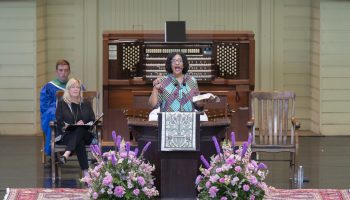
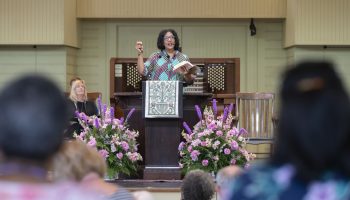
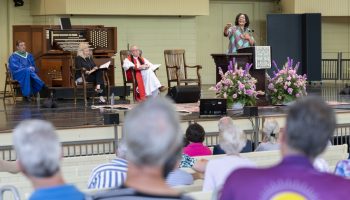
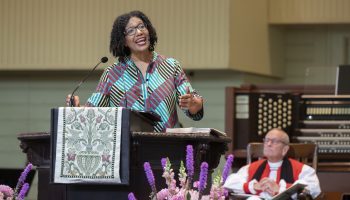
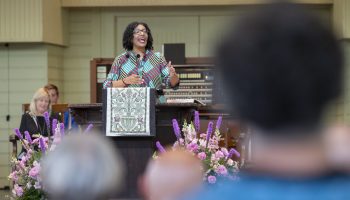
The current crop of “religious” thinkers offered at Chautauqua is hardly reflective of those original Christian thought leaders who initiated the Institution. True Biblical Christianity seems a lost ideal on those placed on the lecture circuit today. What comes across is “spiritual discourse” without any power of the Spirit, which is only coming from the Word of God. Confusion seems the common denominator from the Department of Religion. Where are the strong defenders of Christianity in the Hall of Philosophy and the great apologists of the faith these days? Obviously, they are not welcome by the planners of the program. So what you get, is the discourse from the perspective of individuals more concerned with humanism and the promotion of perversion than anything else. But isn’t it a good thing that they have the freedom to speak as they choose, based on a societal framework resulting from a Judeo-Christian worldview that alone provides ultimate FREEDOM. We have been blessed in America in the past, of which the Chautauqua platform celebrated, but one can’t expect any blessing from the type of “Christian” analysis which this lecture typifies. Time for Chautauquans to start reading their Bible again.